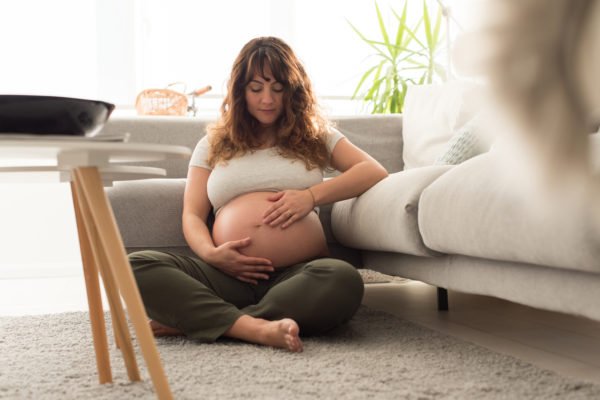
How to Cope With Pregnancy During Quarantine
It is never easy to say when is a good time for your baby to be born, but lockdown brings a new degree of uncertainty with it! Pregnancies are usually the time we dream of baby moons, baby showers, and showing off your bump to your nearest and dearest as you eagerly await the arrival of your bundle of joy. But lockdown pregnancies couldn’t be further from this.

The birth of a first child is an amazing time and an epic, momentous occasion in any adult’s life. But with the COVID‑19 outbreak and lockdown, we’re just in this very unknown, unprecedented time for all of us. The unknowns associated with a pandemic feel overwhelmingly weighty stacked up next to the unknowns of a pregnancy. And understandably, many pregnant women are scared, anxious and upset, instead of enjoying this magical time in their lives. After all, this is not the stuff of the stress-reducing, preparing-for-birth mediations and mantras you had expected to be indulging in those weeks before your due date. Being pregnant and navigating through the minefield of hormones is a challenging enough, but adding self-isolation into the mix brings an even greater challenge, so it’s no wonder that new and expectant mothers are suffering at this time.
To reassure everyone, all birth units and labour wards are fully functioning and vigilant to any potential COVID cases, ready to deliver your baby in a safe manner, appropriate to your needs. Anaesthetists are on standby to administer epidurals and the theatre team are ready and fully kitted in case you need a Caesarean section. Your gynecologist may look a little different in PPE and you may not be able to hear what they’re saying as clearly, but your care won’t be affected.
In this article, as we hope to give you some support during your pregnancy, we have asked Dr Shree Datta, a gynecologist for women’s intimate healthcare brand INTIMINA, to share her answers on commonly asked questions surrounding pregnancy during quarantine.

How to stay active at home during pregnancy:
Firstly, it’s important to stress that exercise in pregnancy is safe – in moderation! The Royal College of Obstetricians and Gynaecologists (look into https://www.sydneyobstetricianclinic.com.au/ to book an appointment with the best ones) recommend aiming for at least 150 minutes of moderate intensity exercise every week throughout pregnancy. This can include swimming, jogging or pilates for example, but if you can’t leave the house, there are plenty of exercises which count at home.
If you don’t consider yourself to be very active, start gradually and work your way up to 150 minutes a week – remember every activity counts, usually in bursts of 10 minutes. This includes activities which strengthen muscles twice a week and whilst there is no evidence of harm by undertaking exercise, you must listen to your body and adjust your level and duration of activity or exercise accordingly.
If you’re not sure what type of exercise is appropriate for you, or if you have any medical conditions, speak to your midwife or doctor before going ahead.
How to work your pelvic floor muscles:
I would certainly recommend pregnant women consider starting pelvic floor exercises from 34 weeks onwards as there is some evidence that this reduces the extent of vaginal tears or episiotomy at the time of delivery. This includes perineal massage – so there’s no need to go out and buy lots of fancy or expensive equipment, but you do need to undertake these exercises daily until your delivery and beyond to improve pelvic tone after pregnancy.
To help train your pelvic floor, Intimina’s KegelSmart device sets a routine that is simple to follow, safe to use and tailored to your individual needs.
How to stay relaxed during quarantine:
The activities that you enjoy at home on a regular basis are paramount – this can be anything from reading to watching your favourite TV programme, to cooking and getting creative.
Why not try something that you have never done before? Make sure you speak regularly with friends and family and allocate some time for yourself each day to meditate or relax to music. Above all, try and establish a routine, which includes eating well and going to bed at regular times.
How to do antenatal classes while your at home:
It is worth speaking to your midwife or GP to find out what is in place locally. Also, do a search online, on youtube and Instagram to find classes that work with you – in some cases, you can also opt for one-to-one virtual advice sessions. There are also Facebook groups and online forums aimed at mums-to-be which may be helpful to you in your area. It’s useful to look for what is available locally for when lockdown lifts as this is a great chance to build new relationships with other mums-to-be.
Falling pregnant during a pandemic:
If you would prefer not to fall pregnant during this unique time, consider using contraception. There is little evidence on the impact of coronavirus in pregnancy at the moment. If you do fall pregnant, consult your doctor to see whether an early pregnancy scan is advisable; the evidence at the moment does not suggest there is an impact to the baby in early pregnancy. Remember that even if you do conceive now, your delivery will be in nine months, and we all can hope that the situation will have improved by then. However, this is a big decision and you will need to discuss it with your partner to weigh up the pros and cons before deciding whether you are comfortable to try and conceive. Remember to take your prenatal vitamins if you are trying to conceive.
Precautions to take when going to the doctors:
A lot of doctors are offering virtual or online consultations, so it is worth checking with your local team as to what they are able to offer, especially if you are looking for a Naturopath Virtual Appointment. If you do have to attend, many women are choosing to attend discrete stand alone clinics rather than hospitals. You will often be screened before being allowed to enter the premises – things to watch for include a persistent new cough and a temperature. If you show symptoms of COVID, please call ahead to find out whether you can attend and if not, what you should do.
Coronavirus baby boom:
Whilst there is no doubt that the coronavirus lockdown has increased intimacy, the jury’s out on whether this will translate into a baby boom – and this may vary from country to country. There is no national recommendation to stop trying to conceive and in fact the Royal College of Obstetricians and Gynaecologists have thus far not found any proven risks in early pregnancy.
Top pregnancy books for expecting mothers to read during lockdown:
Mumplusone provides an approved and definitive online guide to pregnancy and the first year of motherhood, with articles such as what to expect at the delivery by Obstetrician Shree Datta and advice from the Maternity Voices Partnership. There are plenty of books to choose from, perhaps take a look on amazon – but one that stands out is Pregnancy Milestones by Hannah Fox, which has been written with the help of a range of experts. Try not to get too drawn into individual comments on online forums – remember everyone’s experience of pregnancy is unique and use the material you read to develop a core understanding of pregnancy and birth. Speak to your midwife and doctor if you have any queries.














































